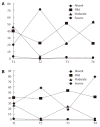Evaluation of thermal water in patients with functional dyspepsia and irritable bowel syndrome accompanying constipation
- PMID: 16688801
- PMCID: PMC4087988
- DOI: 10.3748/wjg.v12.i16.2556
Evaluation of thermal water in patients with functional dyspepsia and irritable bowel syndrome accompanying constipation
Abstract
Aim: To evaluate the efficacy of water supplementation treatment in patients with functional dyspepsia or irritable bowel syndrome (IBS) accompanying predominant constipation.
Methods: A total of 3872 patients with functional dyspepsia and 3609 patients with irritable bowel syndrome were enrolled in the study by 18 Italina thermal centres. Patients underwent a first cycle of thermal therapy for 21 d. A year later patients were re-evaluated at the same centre and received another cycle of thermal therapy. A questionnaire to collect personal data on social and occupational status, family and pathological case history, life style, clinical records, utilisation of welfare and health structure and devices was administered to each patient at basal time and one year after each thermal treatment. Sixty patients with functional dyspepsia and 20 with IBS and 80 healthy controls received an evaluation of gastric output and oro-cecal transit time by breath test analysis. Breath test was performed at basal time and after water supplementation therapies. Gastrointestinal symptoms were evaluated at the same time points. Breath samples were analyzed with a mass spectometer and a gascromatograph. Results were expressed as T(1/2) and T-lag for octanoic acid breath test and as oro-cecal transit time for lactulose breath test.
Results: A significant reduction of prevalence of symptoms was observed at the end of the first and second cycles of thermal therapy in dyspeptic and IBS patients. The analysis of variance showed a real and persistant improvement of symptoms in all patients. After water supplementation for 3 wk a reduction of gastric output was observed in 49 (87.5%) of 56 dyspeptic patients. Both T(1/2) and T-lag were significantly reduced after the therapy compared to basal values [91 +/- 12 T(1/2) and 53 +/- 11 (T-lag), Tables 1 and 2] with results of octanoic acid breath test similar to healthy subjects. After water supplementation for 3 wk oro-cecal transit time was shorter than that at the beginning of the study.
Conclusion: Mineral water supplementation treatment for functional dyspepsia or constipation accompanying IBS can improve gastric acid output and intestinal transit time.
Figures



References
-
- Morrissey JF, Reichelderfer M. Gastrointestinal endoscopy (2) N Engl J Med. 1991;325:1214–1222. - PubMed
-
- Colin-Jones DG. The management of dyspepsia. Scand J Gastroenterol Suppl. 1988;155:96–100. - PubMed
-
- Talley NJ, Weaver AL, Zinsmeister AR, Melton LJ 3rd. Onset and disappearance of gastrointestinal symptoms and functional gastrointestinal disorders. Am J Epidemiol. 1992;136:165–177. - PubMed
-
- Talley NJ, Zinsmeister AR, Schleck CD, Melton LJ 3rd. Dyspepsia and dyspepsia subgroups: a population-based study. Gastroenterology. 1992;102:1259–1268. - PubMed
MeSH terms
Substances
LinkOut - more resources
Full Text Sources
Medical

